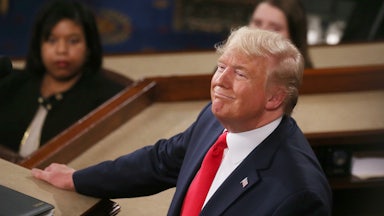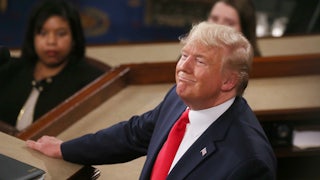As I thumbed through the trove of Jeffrey Epstein emails released by Congress last week, I thought often of John Adams. The nation’s second president was not without his flaws, but they were typically outshone by his perceptive understanding of what republics like the early American state need if they are to endure.
Republics are so normative that it is easy to forget how rare they were when Americans broke away from the British Empire. When early American statesmen imagined their new republic, they had only a few examples to draw from: ancient Greek city-states, pre-Augustan Rome, the Italian merchant republics, and so on. A country without a king was an unusual thing.
Adams and his associates knew that these republics rarely endured. Sometimes they were simply conquered, as any nation might be, but more often than not they collapsed from within—typically felled by corruption and oligarchy. The Greeks elected tyrants. The Romans, who had seized power from kings, surrendered it to emperors. The Italians fell under the sway of wealthy nobles who treated public resources like family firms.
The United States could avoid that fate, Adams noted, by maintaining high moral standards. “Public virtue cannot exist in a nation without private [virtue], and public virtue is the only foundation of republics,” he wrote to an acquaintance in June 1776. “There must be a positive passion for the public good, the public interest, honour, power, and glory, established in the minds of the people, or there can be no republican government, nor any real liberty.”
Reading the Epstein emails is like absorbing the negation of the Founders’ dream. Epstein pleaded guilty in 2008 to state charges in Florida for soliciting an underage girl for prostitution. It was generally understood even then that this was the tip of a rotten iceberg. Yet Epstein kept his place in elite society, maintaining quiet friendships with people from across the political and ideological spectrum.
There are a lot of conspiracies surrounding Epstein, an inevitability when a wealthy sexual predator with a lot of famous friends is found dead by suicide in a prison cell. The emails themselves do not describe specific criminal acts by anyone in particular, though they point toward unsavory behavior by more than a few people. What they do underscore, rather emphatically, is the utter absence of any sort of civic virtue.
Last week, members of the House Oversight Committee released thousands of pages of emails, text messages, and other documents that they had obtained from Epstein’s estate. He died in 2018 while awaiting trial on a host of charges related to underage sex trafficking. This trove is distinct from what many have called “the Epstein files,” which are the investigatory materials in the Justice Department’s possession.
First, Democrats on the committee released a tranche of documents that shed new light on Epstein’s relationship with Trump. The president famously does not text or email other people, so his own words aren’t present in the documents, but Epstein described his interactions with Trump to third parties. In one email, Epstein alleged that Trump “spent hours at my house” with one of Epstein’s victims, and in another, he claimed that Trump “knew about the girls,” an apparent reference to the financier’s sex-trafficking schemes.
Committee Republicans responded by releasing a much larger trove of documents that capture Epstein’s interactions with a significant chunk of what one might describe as the American elite. The contents are often mundane but frequently stomach-churning. They also capture the amorality and decadence of some of the most influential people in the country.
Lawrence Krauss, a prominent astrophysicist who resigned from his university posts amid a sexual harassment scandal, sought advice from Epstein (of all people) on handling the growing turmoil. Steve Bannon, a prominent MAGA leader and then–White House adviser, corresponded regularly with Epstein on a variety of matters, including improving the latter’s image. In one ugly exchange, Epstein suggested to Bannon that he could try to discredit Christine Blasey Ford—who alleged that now–Justice Brett Kavanaugh sexually assaulted her when they were teenagers—during the confirmation battle by publicly insinuating that she was taking memory-affecting drugs for purported psychiatric disorders. (Bannon, to my knowledge, did not follow Epstein’s advice.)
Epstein’s wide-ranging contacts were already public knowledge in recent years, but the emails add new light and texture to his relationships with important and powerful people. He offered to introduce Peter Thiel, an apparent acquaintance, to his friend Woody Allen. He casually mentioned his friendships with the Clintons, the (now former) Duke of York, various Middle Eastern leaders, influential figures in academia, finance, government, the arts, and more—relationships that largely endured despite his well-known offenses.
Among the most telling interactions are those between Epstein and Larry Summers. If anyone could be counted among the nation’s elite it would be Summers: he served as a treasury secretary during the Clinton administration and later became the president of Harvard University for a time. (More on his Harvard tenure later.) For some reason, Summers maintained an active friendship with Epstein long after his 2008 arrest and corresponded with him regularly in 2018 and 2019. He has since said that he regrets having done so.
In some of the exchanges, Summers made the baffling decision to ask Epstein for advice on courting a woman who viewed him as an “economics mentor.” The two men use the nickname “peril” when mentioning the woman—who is an accomplished economist and academic in her own right—in an apparent reference to her Chinese ethnic background and the “yellow peril” trope. Summers told Epstein about his efforts to romance her via their professional relationship, which were apparently unsuccessful. His “best shot,” Summers explained, was that she would find him “invaluable and interesting” and realize “she can’t have it without romance/sex.”
This is not Summers’s first public episode of misogyny. In 2005, he remarked at an academic conference that fewer women might be represented in scientific and mathematical fields because of innate biological differences between the sexes. Summers later apologized after intense public backlash, and his resignation from the Harvard presidency the following year stemmed in large part from the scandal. (He remained on Harvard’s faculty and teaches there to this day.)
In an apparent reference to the scandal, Summers told Epstein in one email, “I observed that half of the IQ In [the] world was possessed by women without mentioning they are more than 51 percent of population.” He also appeared to downplay the gravity of sexual harassment. “I’m trying to figure why American elite think if u murder your baby by beating and abandonment it must be irrelevant to your admission to Harvard,” Summers wrote to Epstein at one point in 2017. “But hit on a few women 10 years ago and can’t work at a network or think tank. DO NOT REPEAT THIS INSIGHT.”
Perhaps the most haunting aspect of the Epstein emails is how the now-dead financier described Trump himself. In Epstein’s eyes, the president is exactly who he seems to the rest of us. His public persona is not an act to thrill his supporters, nor it is a caricature invented by his critics and foes. “Recall I’ve told you, I have met some very bad people, none as bad as Trump,” Epstein told Summers during Trump’s first term. “Not one decent cell in his body. So yes, dangerous.” In a 2018 exchange with Kathy Ruemmler, a former White House counsel in the Obama administration, he remarked, “You see, I know how dirty Donald is.”
It would be tempting to dismiss the Epstein scandals as a purely elite phenomenon. But this is the society for which the American people have voted. The 2016 election could once be dismissed as a constitutional fluke since most Americans voted for Trump’s opponent. The 2024 election is more definitional. This country had nearly a decade of experience with Trump in power—the corruption, the lies, the bigotry and misogyny and abuse and violence—and welcomed more of it.
At its core, Trumpism is a permission structure for evil. It is the abolition of ethical norms and the erasure of moral authority. It defies checks and balances, rejecting the notion that power can be abused or corrupted because it justifies itself. Trumpism is not really about immigration, or inflation, or trade, or draining the swamp, or building the wall—it is ultimately about the dark thrill of abusing those whom its adherents consider to be inferiors, either directly or by proxy.
This is why the second Trump administration is populated with such ghoulish figures. Secretary of Defense Pete Hegseth’s own mother described him as an “abuser” who “belittles, lies, cheats, sleeps around, and uses women for his own power and ego.” He is now purging women and minority service members from the armed forces, blaming “wokeness” for past military defeats and unwinding decades of efforts to make the nation’s military reflect the nation itself.
Robert F. Kennedy Jr., the secretary of health and human services, allegedly introduced his own family members to illegal drugs, cheated on his wife multiple times, allegedly assaulted his children’s babysitter, and hung out with Epstein and Ghislaine Maxwell on multiple occasions. He is now spending his time undermining public confidence in vaccines, dismantling the nation’s public health infrastructure, and misleading parents about the causes of conditions like autism.
Trump almost managed to install Matt Gaetz, a former Republican member of Congress who barely practiced law, as the nation’s attorney general. His nomination only failed because Gaetz so thoroughly repulsed his own Republican colleagues on Capitol Hill that even Trump’s demand could not sway them. A House Ethics Committee investigation concluded that he had likely slept with an underage girl; The New York Times reported recently that she was homeless at the time.
Economic and social precarity always enables abuse. Perhaps that is why the Trump administration has gone to such great lengths to destabilize large swaths of American life. Russ Vought, the head of the White House Office of Management and Budget, bragged to wealthy donors that he wanted federal employees to be “traumatically affected” by his planned mass layoffs. He largely dismantled the Consumer Financial Protection Bureau, which protects Americans from financial scams and exploitation, and worked to weaken public-sector unions that help protect civil servants from illegal conduct.
It is also no small wonder that the Trump administration’s policies are largely about inflicting harm on the people who voted for it (and the tens of millions who didn’t). Trump’s tariff policies effectively allow him to extort foreign trading partners and American industries alike into ideological compliance. By simultaneously waging war on American higher education and the federal government’s research-funding infrastructure, Trump and his allies apparently hope to de-educate millions of Americans and force them into menial, low-wage industrial jobs.
“The army of millions and millions of human beings screwing in little screws to make iPhones—that kind of thing is going to come to America,” Secretary of Commerce Howard Lutnick bragged to CNBC in April. Americans, he argued, are now destined for a form of industrial serfdom. “This is the new model, where you work in these plants for the rest of your life, and your kids work here, and your grandkids work here,” he later rejoiced in an interview in May. Lutnick, coincidentally enough, was Epstein’s former next-door neighbor in New York City. His own children are reportedly set to make millions at a major investment firm thanks to their father’s tariff policies.
In Trump’s America, all of us are not created equal. There is a hierarchy atop which the Lutnicks and Kennedys and Thiels and Musks of the world can prosper, free from government regulation or union negotiations or press scrutiny or law enforcement investigations. Everyone else is part of a underclass whom the wealthy can abuse and immiserate at their own discretion. The Epstein emails give the rest of us a glimpse into this world, where even the most grotesque crimes can be forgiven or ignored out of a sense of elite solidarity—at least until they become too publicly awkward to privately sustain—and where amorality is required to participate.
The Founders were not without their own sins, of course, but at least they had higher aspirations for their new nation. “Avarice, ambition, revenge, and licentiousness would break the strongest cords of our Constitution, as a whale goes through a net,” Adams once wrote to another friend. “Our Constitution was made only for a moral ... people. It is wholly inadequate to the government of any other.” So far, Americans are failing that test—and the republic itself.




